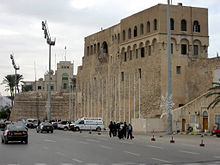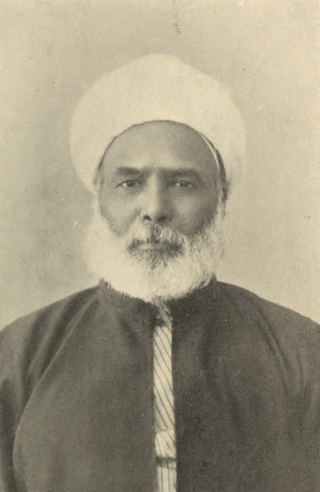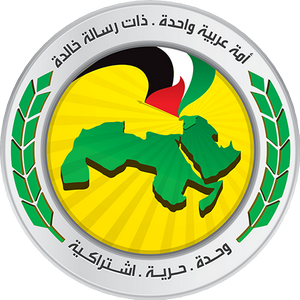
The National Archives of Libya (Dar al-Mahfuzat al-Tarikhiyya) is the national archives of Libya, located in the Red Castle in Tripoli. [1] [2] As of 1980 it was overseen by Salaheddin Hasan al-Suri, Director of Antiquities.

The National Archives of Libya (Dar al-Mahfuzat al-Tarikhiyya) is the national archives of Libya, located in the Red Castle in Tripoli. [1] [2] As of 1980 it was overseen by Salaheddin Hasan al-Suri, Director of Antiquities.

The United States Air Force, Navy, and Marine Corps carried out air strikes, code-named Operation El Dorado Canyon, against Libya on 15 April 1986 in retaliation for the West Berlin discotheque bombing ten days earlier, which U.S. President Ronald Reagan blamed on Libyan leader Muammar Gaddafi. There were 40 reported Libyan casualties; one U.S. plane was shot down. One of the claimed Libyan deaths was of a baby girl, reported to be Gaddafi's daughter, Hana Gaddafi. However, there are doubts as to whether she was really killed, or whether she truly existed.

Tripoli is the capital and largest city of Libya, with a population of about 1.183 million people in 2023. It is located in the northwest of Libya on the edge of the desert, on a point of rocky land projecting into the Mediterranean Sea and forming a bay. It includes the port of Tripoli and the country's largest commercial and manufacturing center. It is also the site of the University of Tripoli.

The Arab Socialist Baʿth Party was a political party founded in Syria by Mishel ʿAflaq, Ṣalāḥ al-Dīn al-Bīṭār, and associates of Zakī al-ʾArsūzī. The party espoused Baʿathism, which is an ideology mixing Arab nationalist, pan-Arab, Arab socialist, and anti-imperialist interests. Baʿthism calls for unification of the Arab world into a single state. Its motto, "Unity, Liberty, Socialism", refers to Arab unity, and freedom from non-Arab control and interference.

The Garamantes were ancient peoples, who may have descended from Berber tribes, Toubou tribes, and Saharan pastoralists that settled in the Fezzan region by at least 1000 BC and established a civilization that flourished until its end in the late 7th century AD. The Garamantes first emerged as a major regional power in the mid-2nd century AD and established a kingdom that spanned roughly 180,000 km2 (70,000 sq mi) in the Fezzan region of southern Libya. Their growth and expansion was based on a complex and extensive qanat irrigation system, which supported a strong agricultural economy and a large population. They subsequently developed the first urban society in a major desert that was not centered on a river system; their largest town, Garama, had a population of around four thousand, with an additional six thousand living in surrounding suburban areas. At its pinnacle, the Garamantian kingdom established and maintained a "standard of living far superior to that of any other ancient Saharan society" and was composed of "brilliant farmers, resourceful engineers, and enterprising merchants who produced a remarkable civilization."

Muḥammad ʿAbduh was an Egyptian Islamic scholar, judge, and Grand Mufti of Egypt. He was a central figure of the Arab Nahḍa and Islamic Modernism in the late 19th and early 20th centuries.

Jaghbub is a remote desert village in the Al Jaghbub Oasis in the eastern Libyan Desert. It is actually closer to the Egyptian town of Siwa than to any Libyan town of note. The oasis is located in Butnan District and was the administrative seat of the Jaghbub Basic People's Congress. The town remains highly obscure, in spite of the substantial colonial history the city holds. The town was the birthplace of Idris of Libya on 12 March 1890.

Muammar Gaddafi became the de facto leader of Libya on 1 September 1969 after leading a group of young Libyan Army officers against King Idris I in a bloodless coup d'état. After the king had fled the country, the Revolutionary Command Council (RCC) headed by Gaddafi abolished the monarchy and the old constitution and established the Libyan Arab Republic, with the motto "freedom, socialism and unity". The name of Libya was changed several times during Gaddafi's tenure as leader. From 1969 to 1977, the name was the Libyan Arab Republic. In 1977, the name was changed to Socialist People's Libyan Arab Jamahiriya. Jamahiriya was a term coined by Gaddafi, usually translated as "state of the masses". The country was renamed again in 1986 as the Great Socialist People's Libyan Arab Jamahiriya, after the United States bombing that year.

Narratives of Islamic Origins: The Beginnings of Islamic Historical Writing is a 1998 book by historiographer of early Islam Fred Donner. The work was first published in January 1998 through Darwin Press as the fourteenth volume in the Studies in Late Antiquity and Early Islam series and has since gone through three editions.
The New Constitutional Liberal Party, most commonly known as Neo Destour, was a Tunisian political party founded in 1934 in Dar Ayed, the house of independence activist Ahmed Ayed, by a group of Tunisian nationalist politicians during the French protectorate. It originated from a split with the Destour party.

Libya–United States relations are the bilateral relations between the State of Libya and the United States of America. Relations are today cordial and cooperative, with particularly strong security cooperation only after the 2012 attack on the US liaison office or mission in Benghazi. Furthermore, a Gallup poll conducted in March and April 2012 found that Libyans had "among the highest approval" of US leadership in the entire Middle East and North Africa region.

Italian Tripolitania was an Italian colony, located in present-day western Libya, that existed from 1911 to 1934. It was part of the territory conquered from the Ottoman Empire after the Italo-Turkish War in 1911. Italian Tripolitania included the western northern half of Libya, with Tripoli as its main city. In 1934, it was unified with Italian Cyrenaica in the colony of Italian Libya. In 1939, Tripolitania was considered a part of the Kingdom of Italy's 4th Shore.

The foreign relations of Libya were largely reset at the end of the Libyan Civil War, with the overthrow of Muammar Gaddafi and the Second Libyan Civil War. The current Minister of Foreign Affairs since 15 March 2021 is Najla Mangoush. Although many foreign embassies in Tripoli closed down in 2014 due to the fighting, by the end of 2017 thirty diplomatic missions were reopened in the Libyan capital.
The Libyan Studies Center is a cultural center opened in 1978 in Tripoli, Libya. It holds 100,000 volumes.

The Arab Socialist Ba'ath Party – Syria Region, officially the Syrian Regional Branch, is a neo-Ba'athist organisation founded on 7 April 1947 by Michel Aflaq, Salah al-Din al-Bitar and followers of Zaki al-Arsuzi. The party has ruled Syria continuously since the 1963 Syrian coup d'état which brought the Ba'athists to power. It was first the regional branch of the original Ba'ath Party (1947–1966) before it changed its allegiance to the Syrian-dominated Ba'ath movement (1966–present) following the 1966 split within the original Ba'ath Party. Since their ascent to power in 1963, neo-Ba'athist officers proceeded by stamping out the traditional civilian elites to construct a military dictatorship operating in totalitarian lines; wherein all state agencies, party organisations, public institutions, civil entities, media and health infrastructure are tightly dominated by the army establishment and the Mukhabarat.

The 1969 Libyan revolution, also known as the al-Fateh Revolution or 1 September Revolution, was a coup d'état and revolution carried out by the Free Officers Movement, led by Colonel Muammar Gaddafi, which overthrew the Senussi monarchy of King Idris I and resulted in the formation of the Libyan Arab Republic.
Knut Sigurdson Vikør is a Norwegian historian and a professor of history at the University of Bergen. He is known for his studies on the history of Islam and Islamic law.

Israel–Libya relations describes the relations between Israel and Libya. While there have been no formal diplomatic agreements between Israel and Libya since Libya's independence, there have been some notable events and developments in their relationship over the years. One of the main reasons for Libya's antagonism towards Israel has been its support for the Palestinian cause. Libya, under the rule of Muammar Gaddafi, was a staunch supporter of the Palestinian cause and provided aid and support to various Palestinian militant groups.
Khalid Al Hud Al Gargani, also known as Khalid Al Hud, was a Libyan businessman and one of the most influential advisors of King Abdulaziz, founder of the Kingdom of Saudi Arabia in 1932.
Al Hawadeth was a weekly news magazine which was published in Beirut, Lebanon, in the period 1911–2014 with some interruptions. The magazine is known for its publishers and editors: Salim Lawzi who was assassinated in March 1980, and Melhem Karam, who was a veteran journalist.
Rayṭa bint al-Saffāḥ was an Abbasid princess, daughter of first Abbasid caliph al-Saffah, niece of second Abbasid caliph al-Mansur and the first wife of third Abbasid caliph al-Mahdi.
Libyan Government Archives
Libyan State Archive
National Archives
Dar al-mahfuzat al-tarikhiyah (Libyan Historical Archives)